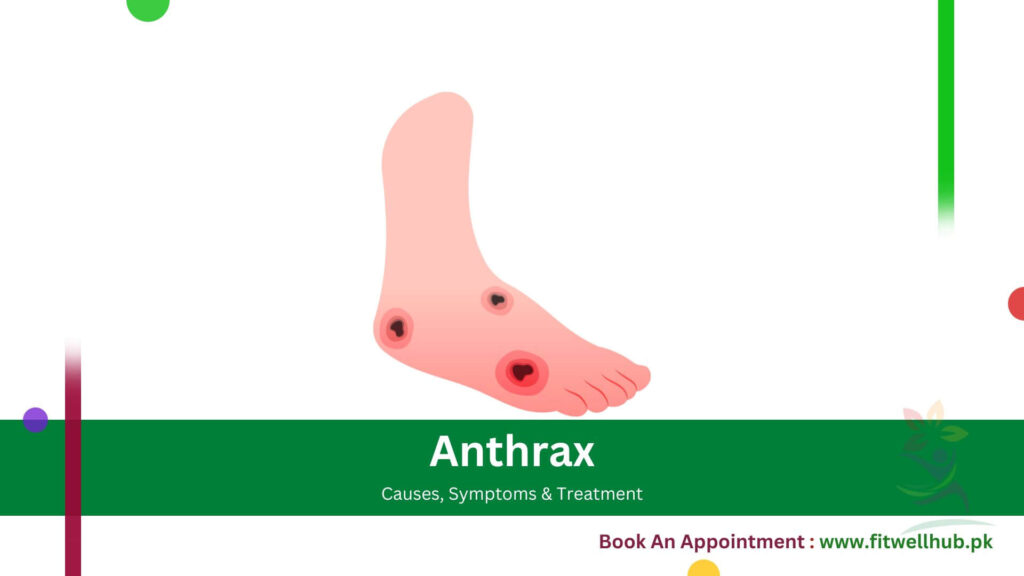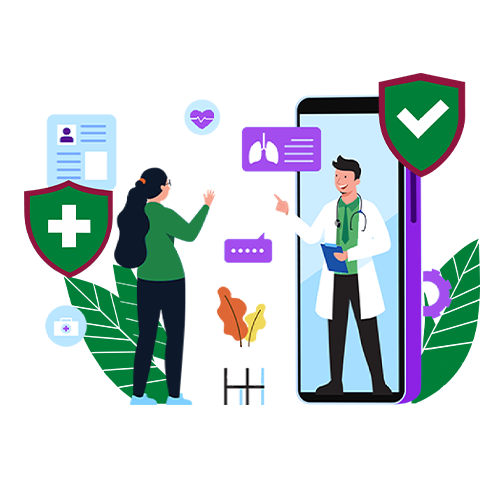Anthrax is a severe infectious disease resulting from a bacterium named Bacillus anthracis. It affects animals like sheep, goats, and cattle but may infect humans too. Humans can adopt anthrax by inhaling spores or by indirect or direct connection with infected animals or their products. There are various types of this disease, such as gastrointestinal, injection, inhalation, and cutaneous anthrax, each with different severity and symptoms. Anthrax may be life-threatening if left untreated, especially the inhalation type, which has a high mortality rate.
Quick Links
ToggleEarly detection and treatment with medications like antibiotics are important for a positive result. Even though anthrax rarely occurs in humans, it remains a serious concern to public health, particularly in regions with insufficient livestock vaccination programs. Moreover, anthrax spores have also been employed as a biological weapon, emphasizing the significance of knowledge and readiness.
You can also learn about Athlete’s Foot, Click HERE!
Symptoms Of Anthrax
The symptoms of anthrax vary depending on the cause of infection. The main symptoms related to various types of anthrax are as follows:
Cutaneous Anthrax
- Small, itchy bump (like an insect bite)
- Swelling around the bump
- Painless ulcer with a black center
Inhalation Anthrax
- Fever and chills
- Chest discomfort
- Shortness of breath
- Coughing up blood
- Nausea and vomiting
Gastrointestinal Anthrax
- Nausea and vomiting
- Severe abdominal pain
- Diarrhea, possibly bloody
- Loss of appetite
Injection Anthrax
- Redness at the injection site
- Significant swelling
- Fever and chills
- Abscess formation
When to See a Doctor
If you feel you have been exposed to anthrax, especially when you observe symptoms such as severe abdominal pain, skin ulcer with a black center, or flu-like signs after a significant exposure, consult a doctor immediately. Early intervention and prevention are important to prevent severe complications and improve recovery chances.
FitwellHub offers access to professional and specialized doctors and assists in evaluating and managing significant anthrax exposure.
Causes
Bacillus anthracis is the source of anthrax. It develops spores that are very strong and able to propagate to human beings as well as animals by several pathways. Such spores can survive for long periods in adverse environmental conditions.
- Contact with infected animals or animal products: Humans can be exposed to anthrax by processing and handling animal products like wool, bone from infected animals, and hides.
- Inhalation of anthrax spores: The most serious type of disease, inhalation of anthrax results from the inhalation of spores in industrial areas where infected animal products are manufactured.
- Consumption of contaminated meat: Gastrointestinal anthrax can occur due to eating contaminated or undercooked meat of infected animals.
- Injection of contaminated drugs: Injecting contaminated drugs, such as heroin, can result in the injection of anthrax, which can cause a serious systemic or local infection.
- Bioterrorism: Anthrax spores can be weaponized and used in bioterrorism, indicating significant public health concern due to their potential for widespread infection.
Anthrax in Pakistan
Anthrax is endemic to Pakistan, especially in agricultural/rural areas which include Cholistan and Tharparkar. Soil studies show that Bacillus anthracis is more prevalent because 40% is found in the soil while 28% in the wool of small ruminants. Though it is uncommon in human beings, outbreaks of anthrax recorded in history, such as the Jhang incident in 1961 with 36 cases & 3 deaths, indicate its significant dangers. Other risk factors contributing to high vulnerability in specific areas include low vaccination rates and floods.
Risk Factors
Several factors that can increase the risk of contracting anthrax are:
- Occupational exposure: People working in occupations such as manufacturing animal products, handling livestock, or in laboratories dealing with anthrax are at greater risk of exposure.
- Travel to endemic areas: Exposure may increase if someone travels to areas where anthrax is common among livestock.
- Handling animal products: Working with animal hides, bone products, or wool can expose people to anthrax spores.
Complications
Anthrax can result in serious and life-threatening complications if not treated early.
1- Septicemia
Septicemia is a severe anthrax complication in which the bacteria enter the bloodstream and the infection spreads throughout the whole body, resulting in a serious inflammatory response that can cause organ failure and shock.
2- Meningitis
Meningitis is a life-threatening condition caused by inhalation anthrax, requiring immediate medical intervention to manage the serious inflammation of the spinal cord and brain.
3- Respiratory failure
Inhalation anthrax can result in serious respiratory disorders, causing respiratory failure if not treated promptly.
4- Organ failure
Anthrax bacteria can spread systematically and result in organ failures, which are usually fatal.
Prevention
Preventing anthrax focuses on decreasing bacteria exposure, particularly in high-risk environments.
- Vaccination: Vaccination is available for people who are at high risk of exposure, including military personnel or workers handling animal products.
- Protective clothing: There are protective clothes that can help prevent exposure during animal handling or animal product processing.
- Safe food practices: Reducing the risk of gastrointestinal anthrax involves making sure meat is properly cooked and avoiding intake of possibly infected meat.
- Avoiding illicit drug use: Refraining from injecting drugs can prevent injection anthrax.
- Handling animal products safely: Taking preventive measures when working with animal hides, bone products, or wool can prevent cutaneous anthrax.
FitwellHub provides programs to promote a Healthy Elite Lifestyle, such as preventive measures for infectious diseases like anthrax. For more information, visit the FitwellHub Help.
Diagnosis
Diagnosis for anthrax varies with type and typically includes laboratory tests, clinical check-ups, and imaging tests.
| Test | Purpose |
|---|---|
| Physical examination | Helps identify symptoms such as respiratory problems or skin ulcers. |
| Blood tests | Assists in identifying the presence of Bacillus anthracis in the bloodstream. |
| Chest X-ray or CT scan | Detects inhalation of anthrax by revealing characteristic variations in the chest cavity and lungs. |
| Skin biopsy | Used to diagnose cutaneous anthrax by detecting the presence of anthrax bacteria in lesions. |
| Stool sample | Analyzes stool to diagnose gastrointestinal anthrax by detecting anthrax spores. |
FitwellHub offers advanced diagnostic services, such as imaging studies and lab tests, to detect anthrax. To schedule a test, visit the LAB.
Treatment
Treatment for anthrax primarily involves the use of antibiotics, along with other supportive care as required.
1- Antibiotics
The basic anthrax treatment includes high-dose antibiotics like doxycycline or ciprofloxacin, frequently combined with other antibiotics such as rifampin or clindamycin.
2- Antitoxin
In severe cases of anthrax, particularly inhalation anthrax, antitoxins like anthrax immune globulin or raxibacumab can be used to prevent the toxins released by the bacterium.
3- Supportive care
Inhalation anthrax may need hospitalization, with critical care assistance such as fluid management and mechanical ventilation to treat shock and respiratory failure.
Medications
Medications for the treatment of anthrax aim to remove the bacteria and neutralize the toxins produced by them.
- Ciprofloxacin: It is an effective antibiotic and is used as the first-line treatment for all types of anthrax.
- Doxycycline: Another significant antibiotic that is used for the effective treatment of anthrax is doxycycline, especially in inhalation and cutaneous forms.
- Clindamycin: Clindamycin is commonly used in combination with other antibiotics for the treatment of severe anthrax cases.
- Raxibacumab: This is an antitoxin, which works against toxins produced by Bacillus anthracis and in severe inhalation anthrax.
- Anthrax immune globulin: When antibiotics alone are not sufficient to manage the disease, another antitoxin named anthrax immune globulin is used for the treatment of serious cases of anthrax.
FitwellHub’s pharmacy provides a range of medicines like antitoxins and antibiotics to treat anthrax. In case you want to order some, visit our pharmacy.
Frequently Asked Questions (FAQ’s)
Anthrax may result in serious complications like skin ulcers, respiratory disorders, digestive problems, and infections in the injection region if not treated early.
Anthrax treatment involves antibiotics such as doxycycline or ciprofloxacin, and serious cases may need antitoxins like anthrax immune globulin.
Anthrax may spread to humans by touching infected products or animals, eating contaminated meat, or inhaling spores.
The four different forms of anthrax are gastrointestinal, injection, cutaneous, and inhalation. The intensity level and symptoms of each anthrax form are different.
Anthrax is not contagious and does not radiate from person to person but through contact with anthrax spores.
Symptoms of inhalation anthrax are shortness of breath, coughing up blood, fever, and chest discomfort, needing sudden medical attention.














